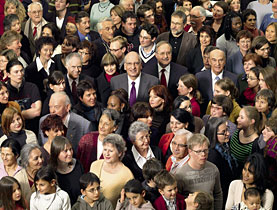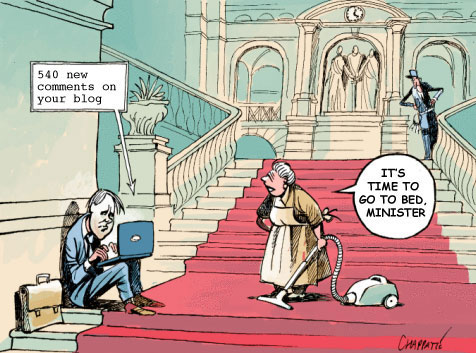Online politics gains ground despite scepticism

An online political survey by the centre-left Social Democrats canvassing views on the launch of possible initiatives has prompted a mixed reaction from rival parties.
Experts say the trend towards increased use of the internet and other modern means for political communication is unstoppable – if it is applied credibly and for specific purposes.
More than 4,000 people took part in the ongoing survey which aims to give participants a say in focusing the political agenda of the Social Democrats.
“It is one way of taking the pulse among the grassroots and we are pleased with the feedback so far,” says party spokesman Peter Lauener.
He adds that such online methods are also important because they allow direct contact with members and supporters abroad, as well as reaching out to new voters.
Daniel Schwarz, a political scientist at Bern University agrees the number of respondents is respectable. But it is not really clear how reliable such a survey, which is open to everybody, can be from a scientific point of view.
“Presumably it’s mainly party members, people from the centre-left political spectrum and probably younger citizens,” he says.
Schwarz, an expert on the independent online election platform, Smartvote, cautions there is a public relations element in the survey, although the public interest appears to be limited for the time being.
Culture of communication
Mark Balsiger, a political advisor and communications expert points out that the party can generate more traffic on its website and hope to win new members.
“It’s a clever strategy. Online communities are based on active members and a dynamic culture of communication.”
The other main political parties are cautious in their appraisal of the online survey.
The centre-right Radical Party described the method of an open online consultation procedure as “interesting, but not new”.
“We will very soon also open up our internal consultation procedure to outside participants and review our entire internet presence,” says party spokesman Damien Cottier.
Scepticism
The centre-right Christian Democrats and the rightwing Swiss People’s Party are much more reticent.
“It appears the Social Democrats have very few ideas of their own,” says People’s Party spokesman Alain Hauert.
“The question is also how representative such a survey is,” adds Tim Frey, secretary-general of the Christian Democrats.
“We must not be dazzled by marketing tricks,” Frey says.
The social platform Facebook and other modern communications technologies are primarily important for private use. The situation in the United States is not comparable with Switzerland with its limited number of internet users, according to Frey.
But he admits that online content remains a challenge for the party, while the People’s Party stresses the need to apply cross-media strategies.
Like the Radicals, the People’s Party is sprucing up its website, using the micro-blog messaging service Twitter and more visual elements.
Dominant
Communications expert Balsiger says all the main parties have invested more effort in their online presence since parliamentary elections nearly two years ago.
“The Social Democrats and the Radicals in particular appear to be at the forefront.”
He says online content will have a dominant role in political communication because of the increasing importance of the internet, and Facebook has become generally accepted, even if the platform is not yet used to its best by politicians.
“You simply disappear from public debates if there is no professional expertise to communicate through online media,” says Balsiger.
Political scientist Schwarz agrees that the internet will play an even more important role in campaigning and for fundraising.
He says it is crucial to make use of the new media in a credible and original manner for a mainly young and urban audience.
“It is not necessarily cheap to come up with something which appeals to users,” Schwarz says.
Urs Geiser, swissinfo.ch
The centre-left Social Democrats and the Greens are credited to be the pioneers in Switzerland on using online media for political purposes.
Since the 2007 parliamentary elections an increasing number of Swiss politicians use Facebook, Twitter or run blogs apart from having their own websites.
The online survey is the first of its kind by the Social Democrats. It prompted the Radicals to consider introducing the same method.
The Swiss People’s Party announced a pre-launch of its party website, including more visual elements and the use of the micro-blog service Twitter.
The Christian Democrats say online communication is a challenge, but warn of overrating it.
The Social Democrats launched an online survey in June to help choose from five possible subjects for a people’s initiative.
Any participant can cast his or her vote until the end of August before the party leadership decides in October.
The online survey is part of a broader consultation procedure among the party rank and file, as well as its local and cantonal chapters.

In compliance with the JTI standards
More: SWI swissinfo.ch certified by the Journalism Trust Initiative






You can find an overview of ongoing debates with our journalists here. Please join us!
If you want to start a conversation about a topic raised in this article or want to report factual errors, email us at english@swissinfo.ch.